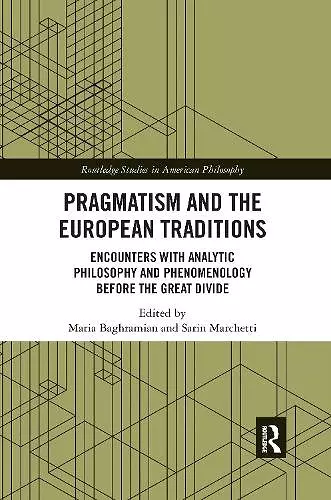Pragmatism and the European Traditions
Encounters with Analytic Philosophy and Phenomenology before the Great Divide
Maria Baghramian editor Sarin Marchetti editor
Format:Paperback
Publisher:Taylor & Francis Ltd
Published:14th Aug '20
Currently unavailable, and unfortunately no date known when it will be back
This paperback is available in another edition too:
- Hardback£155.00(9781138094109)

The turn of the twentieth century witnessed the birth of two distinct philosophical schools in Europe: analytic philosophy and phenomenology. The history of 20th-century philosophy is often written as an account of the development of one or both of these schools, as well as their overt or covert mutual hostility. What is often left out of this history, however, is the relationship between the two European schools and a third significant philosophical event: the birth and development of pragmatism, the indigenous philosophical movement of the United States. Through a careful analysis of seminal figures and central texts, this book explores the mutual intellectual influences, convergences, and differences between these three revolutionary philosophical traditions. The essays in this volume aim to show the central role that pragmatism played in the development of philosophical thought at the turn of the twentieth century, widen our understanding of a seminal point in the history of philosophy, and shed light on the ways in which these three schools of thought continue to shape the theoretical agenda of contemporary philosophy.
"American pragmatism saw itself as the culmination of a process of naturalizing Kant and Hegel in the direction of an empiricism focused on selectional developmental processes of the sort epitomized by evolution and individual learning. This naturalizing, historicizing process was in many ways rudely interrupted by Russell and Husserl, each in his own way inventing something philosophy could be apodeictic about from its armchair. This fascinating volume provides a novel perspective on the familiar twentieth century opposition between analytic philosophy and phenomenology, by viewing those traditions through the mediating lens of their interactions with contemporaneous pragmatism."—Robert Brandom, University of Pittsburgh, USA
"Whether through Husserl’s adaptations of James’s psychology, Ramsey’s refinements of Peirce’s account of truth, Russell’s adaptation of James’s radical empiricism, or the later Wittgenstein’s emphasis on concrete human life, two divergent traditions of twentieth century philosophy—phenomenology and analytic philosophy—were influenced by the pragmatists. The rich and varied essays in this collection break new ground not only in charting these and other pragmatic influences, but in helping us understand pragmatism’s vitality today". —Russell B. Goodman, University of New Mexico, USA
"Pragmatism and the European Tradition is an exemplary specimen of a new kind of collection of philosophical essays. It reviews, with a considerable range and expertise and fresh detail, the sources of doctrinal dissatisfaction involving intractable quarrels between analytic and continental philosophy (chiefly positivism and phenomenology) and the prospects of conceptual mediation by way of pragmatism. Quite a good idea. That’s to say, philosophical rivals must now demonstrate a measure of dialectical skill in reconciling once insurmountable doctrinal divisions. Repays a careful reading."—Joseph Margolis, Temple University, USA
"This collection offers a scholarly and timely corrective to the prevailing narrative of early 20th-century philosophy. According to that narrative, analytic philosophy and phenomenology marginalized pragmatism and never engaged with pragmatism. The essays in this collection show that narrative to rely on either neglecting or misreading important figures. At a time when the very ‘divide’ between analytic and Continental philosophy is being closely scrutinized from multiple perspectives, this book further complicates the story in productive ways."—Carl B. Sachs, Marymount University, USA
ISBN: 9780367593698
Dimensions: unknown
Weight: 453g
294 pages